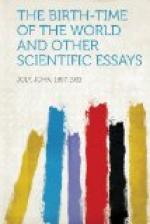“O fearful meditation! Where, alack! Shall Time’s best jewel from Time’s chest lie hid?” —SHAKESPEARE.
IN the material universe we find presented to our senses a physical development continually progressing, extending to all, even the most minute, material configurations. Some fundamental distinctions existing between this development as apparent in the organic and the inorganic systems of the present day are referred to elsewhere in this volume.[2] In the present essay, these systems as having a common origin and common ending, are merged in the same consideration as to the nature of the origin of material systems in general. This present essay is occupied by the consideration of the necessity of limiting material interactions in past time. The speculation originated in the difficulties which present themselves when we ascribe to these interactions infinite duration in the past. These difficulties first claim our consideration.
[1] Proc. Royal Dublin Soc., vol. vii., Part V, 1892.
[2] The Abundance of Life.
288
Accepting the hypothesis of Kant and Laplace in its widest extension, we are referred to a primitive condition of wide material diffusion, and necessarily too of material instability. The hypothesis is, in fact, based upon this material instability. We may pursue the sequence of events assumed in this hypothesis into the future, and into the past.
In the future we find finality to progress clearly indicated. The hypothesis points to a time when there will be no more progressive change but a mere sequence of unfruitful events, such as the eternal uniform motion of a mass of matter no longer gaining or losing heat in an ether possessed of a uniform distribution of energy in all its parts. Or, again, if the ether absorb the energy of material motion, this vast and dark aggregation eternally poised and at rest within it. The action is transferred to the subtle parts of the ether which suffer none of the energy to degrade. This is, physically, a thinkable future. Our minds suggest no change, and demand none. More than this, change is unthinkable according to our present ideas of energy. Of progress there is an end.
This finality a parte post is instructive. Abstract considerations, based on geometrical or analytical illustrations, question the finiteness of some physical developments. Thus our sun may require eternal time to attain the temperature of the ether around it, the approach to this condition being assumed to be asymptotic in
289
character. But consider the legitimate reductio ad absurdum of an ember raked from a fire 1000 years ago. Is it not yet cooled down to the constant temperature of its surroundings? And we may evidently increase the time a million-fold if we please. It appears as if we must regard eternity as outliving every progressive change, For there is no convergence or enfeeblement of time. The ever-flowing present moves no differently for the occurrence of the mightiest or the most insignificant events. And even if we say that time is only the attendant upon events, yet this attendant waits patiently for the end, however long deferred.




